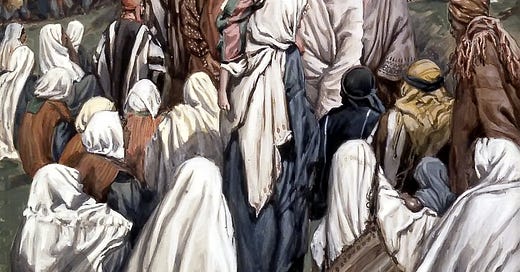“You are the salt of the earth, but if salt has lost its taste, how shall its saltiness be restored? It is no longer good for anything except to be thrown out and trampled under people’s feet.
“You are the light of the world. A city set on a hill cannot be hidden. Nor do people light a lamp and put it under a basket, but on a stand, and it gives light to all in the house. In the same way, let your light shine before others, so that they may see your good works and give glory to your Father who is in heaven.”
Salt isn’t a food in itself. It doesn’t really have a flavor of its own. But it enhances whatever it’s added, drawing out the flavors that are already there.
In the same way, light isn’t something that we typically admire or appreciate in itself—rather, we appreciate it because it helps us see what’s around us.
Last week’s post discussed how the Beatitudes aren’t about blessing who you are now. Rather, blessings come from the good you bring to the world. Through acts of justice and mercy, you break the cycles of power and oppression around you—and in the meantime, you not only show others how to act justly and mercifully. You also become a just and merciful person—one that others will act justly and mercifully towards.
This week’s readings reinforce this point. Jesus teaches us that our goodness is meant to be shared, to be given, to be scattered and dispersed over the earth like salt on your dinner, or like light throughout a dark house.
Jesus isn’t saying that it’s our job to make sure as many people as possible know about our good, merciful, just works. The point isn’t to show the world how virtuous I am—that’s just arrogance and pride. Many of Jesus’s followers have fallen into confusion on just this point; it’s why Christians are so often seen as self-righteous hypocrites.
The world around us sets us up for self-promotion. Social media is perfectly designed to amplify my good works, if I let it. It’s pretty easy to assure everyone online that I’m a virtuous person—a few strategic retweets and likes, a few witty ripostes to my foes is all it takes. But I haven’t brought any good to the world through these actions. And I have damaged my own heart—made myself a little more into a person content to be known as good, without actually being good.
No, the point of Jesus’s teaching here isn’t that it’s important to show others your good deeds. It’s to spread the goodness itself. The goodness in my life, not me myself, is the salt and the light.
I am the salt of the earth when I’m helping others live fully—when I’m drawing out what’s already there in them. And I am light for the world not when others see my own good works or pay attention to me, but when I help them see each other more clearly and charitably.
What platforms for self-promotion are most tempting to you? How can you replace them with actual goodness?
What people around you can you empower, encourage, or equip? How can you help these people become more themselves, more of who you know they can be?






DISINTERESTED BENEVOLENCE is how.